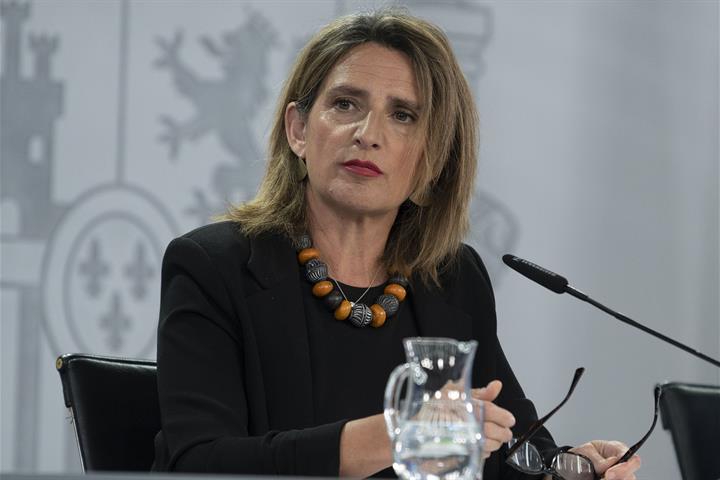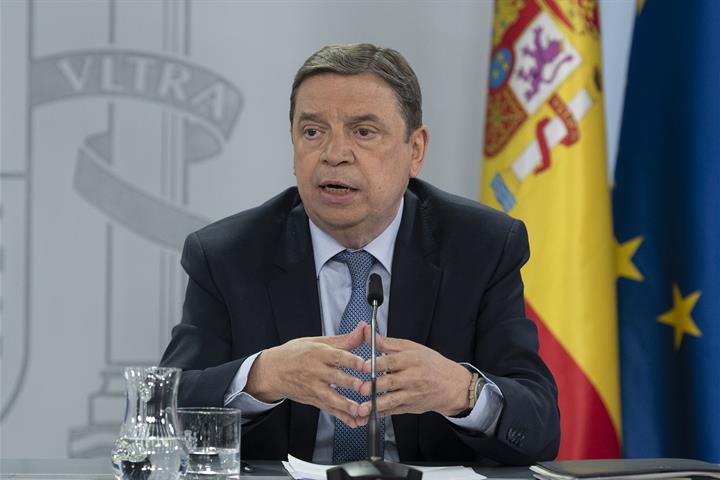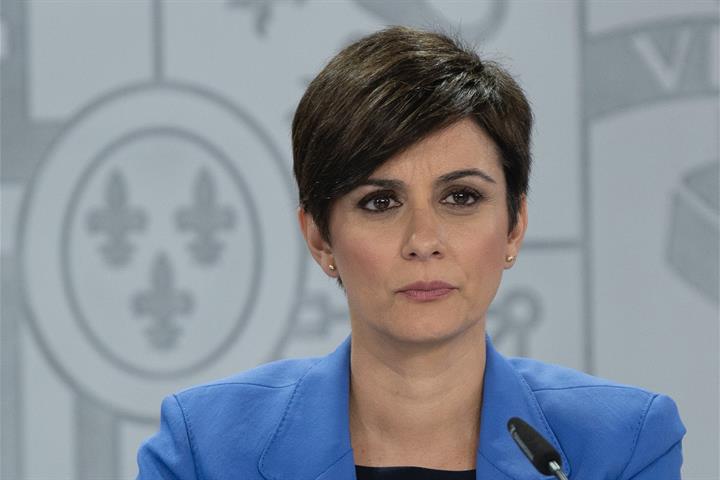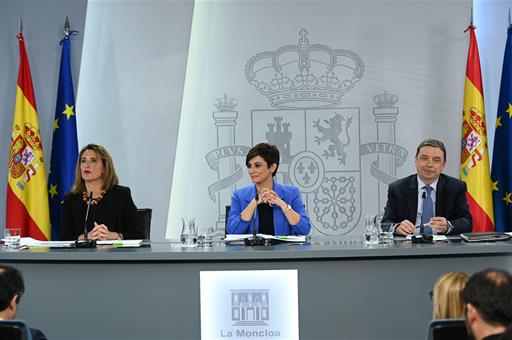Council of Ministers
The Government of Spain allocates new aid to communities and town councils to halt depopulation
Council of Ministers - 2023.4.25
Moncloa Palace, Madrid
The Third Vice-President and Minister for Ecological Transition and Demographic Challenge, Teresa Ribera, has presented the agreements and lines of financing approved by the Council of Ministers on depopulation and the demographic challenge to achieve what she described as "a thirty-minute country", in other words a "guarantee that nowhere in Spain are basic services more than 30 minutes away".
Another of the objectives, explained Ribera, is to continue to increase the population living in towns with less than 5,000 inhabitants, as has happened in the period 2019-2022. In these four years this figure has increased by 200,000 people.
Support to the regional governments
To achieve these aims, the government has approved the distribution to the autonomous communities of €69 million for digital training programmes for citizens in municipalities with less than 20,000 inhabitants. In addition, at a later stage it will allocate €21 million to the most innovative projects. The grants are financed from the Recovery, Transformation and Resilience Plan and, according to Ribera, will benefit 300,000 people.
For its part, the Territorial Cohesion Fund, amounting to €20.2 million, will finance key projects that promote economic and social development in these municipalities. Their distribution has been designed in conjunction with the autonomous communities.
Grants for local entities and from the Biodiversity Foundation
 The Third Vice-President and Minister for Ecological Transition and Demographic Challenge, Teresa Ribera, during her speech at the press conference after the Council of Ministers (Pool Moncloa/Borja Puig de la Bellacasa)
The Third Vice-President and Minister for Ecological Transition and Demographic Challenge, Teresa Ribera, during her speech at the press conference after the Council of Ministers (Pool Moncloa/Borja Puig de la Bellacasa)
With a budget of €16.2 million, the executive has also authorised a new call for proposals for the programme of aid for innovative projects for territorial transformation and the fight against depopulation, aimed at local councils and other local entities.
In addition, the call for aid for forest management, worth €77 million, has been published today by the Biodiversity Foundation.
Teresa Ribera specified that this is a line of aid aimed at diversifying forest use and exploitation, promoting more biodiverse landscapes and reactivating areas that have been devastated by fires.
Rural Campus Programme
The Council of Ministers has also approved the call for applications for the second edition of the Rural Campus Programme, an initiative that allows students to do work experience in villages with less than 5,000 inhabitants.
The third vice-president highlighted that in the first edition 37 public universities and 400 students took part in internships in areas such as the agri-food sector, the bio-economy, sustainable tourism services and high technology. "It was a success in terms of demand and a success in its execution, bringing young university students closer to the rural reality of our territory," he said.
This year's edition will see the amount doubled to €3.2 million so that up to 1,000 students from all over Spain can benefit.
Power distribution networks closed
The Government has approved the Royal Decree that develops the procedure for establishing closed electricity distribution networks. This measure is aimed at industrial estates and will increase the competitiveness of companies by reducing their energy costs by means of sharing the same point of access to the electricity system.
Teresa Ribera stated that the initiative will bring about significant savings for each of the industry's plants and for the system as a whole.
Situation report on the Doñana National Park
Teresa Ribera has updated the Council of Ministers on the Framework of Actions for Doñana, endowed with 356 million euros, which she presented in Almonte (Huelva) on 30 November last year. With a set of short- and medium-term measures, the government aims to reverse the environmental degradation of the National Park and restore its ecological functioning.
The third vice-president considers "the involvement of all the administrations" to be "essential to guarantee the viability of Doñana as a UNESCO World Heritage Site".
Strengthening the agricultural insurance system
 The Minister for Agriculture, Fisheries and Food, Luis Planas, during his speech at the press conference after the Council of Ministers (Pool Moncloa/Borja Puig de la Bellacasa)
The Minister for Agriculture, Fisheries and Food, Luis Planas, during his speech at the press conference after the Council of Ministers (Pool Moncloa/Borja Puig de la Bellacasa)
The Council of Ministers has authorised the agreement between ENESA, the national agricultural insurance company, and Agrupación Española de Entidades Aseguradoras de los Seguros Agrarios (Agroseguro) to implement the annual combined agricultural insurance plan. The estimated cost is €317.7 million.
The Minister for Agriculture, Fisheries and Food, Luis Planas, stressed that over the course of the legislature, the allocation of this instrument "so fundamental for our farmers and stockbreeders vis-à-vis climatic contingencies" has been increased by more than 50%. The combined agricultural insurance system covers 410,000 policies and €14.8 billion of agricultural and livestock production.
Investments in agricultural and livestock programmes
The Government has approved the territorial distribution of €292.7 million for funds for agriculture, livestock and rural development, €207.9 million of which will come from the General Budget and the remaining €84.8 euros from the Recovery Plan.
Luis Planas explained that this funding encompasses three blocks of programmes. The first, worth €158.2 million, corresponds to the state contribution to rural development measures implemented by the autonomous communities. This figure, he pointed out, is much higher than that of the previous reference framework in this area.
The second allocation is of €30.5 million for five specific actions: support for the beekeeping sector, milk yield control, quality of plant varieties, a specific programme for the Canary Islands and national indigenous livestock breeds.
The third block is financed with €104 million and comprises four objectives: the eradication of animal diseases, prevention and control of plant pests, biosecurity and cleanliness in livestock farms, and precision farming, efficiency and the circular economy.
European action on the drought
The Minister for Agriculture, Fisheries and Food has highlighted two complementary actions undertaken by the government vis-à-vis the drought and high temperatures.
Furthermore, Planas has written to the EU Commissioner for Agriculture and Rural Development, Janusz Wojciechowski, requesting the activation of the crisis reserve of the Common Agricultural Policy (CAP) and the possibility for the autonomous communities to use the unexpended amounts of rural development funds.
The executive has also conveyed to the European Commission the desirability of increasing the advance payment of CAP aid made each year in October to the largest possible amount. The Government of Spain also advocates making more flexible both the conditions for receiving basic income support for sustainability, for example in the case of crop rotation, and the requirements for eco-schemes, as some practices covered by them cannot be carried out due to the drought.
Commitment to the primary sector
The minister also highlighted the government's initiative, published today in the Official State Gazette, of a blanket 25% reduction in the modules of the objective estimation, which is applied to more than 828,000 farmers and livestock farmers. The order, which includes specific reductions and others relating to the costs of agricultural diesel and fertilisers, means a reduction in the tax base of around €1.8 billion.
The minister linked the measure to the "exceptional circumstances of the campaign", affected by the consequences of the war in Ukraine and weather conditions. "Our farmers and stockbreeders can rest assured that the Government of Spain will continue to support them," Planas assured.
Annual Regulatory Plan 2022
 The Government Spokesperson and Minister for Territorial Policy, Isabel Rodríguez, during her speech at the press conference after the Council of Ministers (Pool Moncloa/Borja Puig de la Bellacasa)
The Government Spokesperson and Minister for Territorial Policy, Isabel Rodríguez, during her speech at the press conference after the Council of Ministers (Pool Moncloa/Borja Puig de la Bellacasa)
The Council of Ministers has approved the Annual Regulatory Assessment Report for 2022, which analyses the government's regulatory activity and the degree of compliance with last year's Annual Regulatory Plan (PAN-22). This is the third evaluation report approved by the executive and will be published on the Transparency Portal by 30 April.
The Minister for Territorial Policy and Government Spokesperson, Isabel Rodríguez, highlighted that the government approved 365 regulations in 2022, 56 more than the previous year. Moreover, the number of bills passed last year equalled the sum of those passed in the previous four years.
Regarding the degree of compliance with the plan in 2022, the report shows that 79% of the 368 planned regulations have been approved (53%), or are currently being processed (26%).
The spokesperson added that the production of regulations has been conditioned by the impact of the war in Ukraine, which has required the approval of various royal decrees to mitigate its effects on citizens, and by the Recovery Plan, which has meant speeding up all the regulations linked to compliance with it.
World Intellectual and Industrial Property Day
Isabel Rodríguez has informed that the executive has joined in the celebration of this day by means of a declaration that reflects its commitment to continue advancing in the protection of these rights and to promote the participation of women. "We want them to make a decisive contribution to the growth and development of our economy and the democratic quality of our country will increase with their participation", she said.
The spokeswoman pointed out that "Spain has a 26% rate of women inventors, who in 2022 signed almost one in four inventions with European patents in our country and a third of the inventions in national patents".
Honours
The Government has approved the awarding of the Grand Cross Grade of the Order of Isabella the Catholic to US politician Nancy Pelosi, the first female Speaker of the US House of Representatives.
Isabel Rodríguez argued that "good relations with the US and, in particular, with Nancy Pelosi, have made her worthy of recognition".
Non official translation





